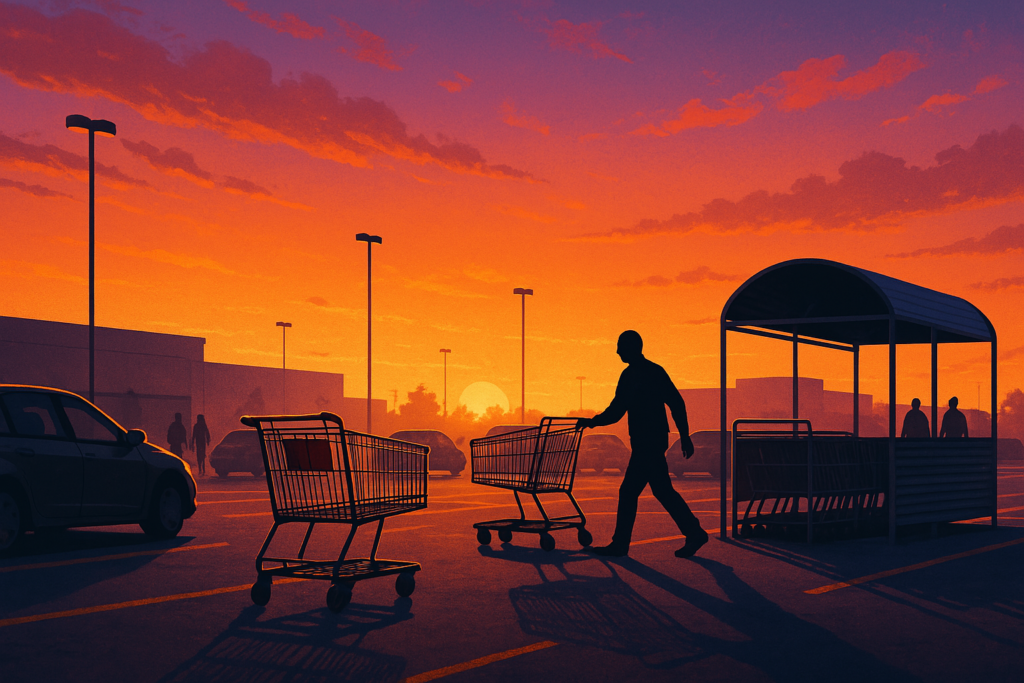
It happens quietly in parking lots across Canada.
You’ve loaded the last of your groceries into the trunk, closed the hatch, and the cart stands there – empty, idle, waiting. What you do next might feel inconsequential, even mundane. But this moment, however fleeting, is the stage for a small but telling act of character. Do you return the cart to its designated area? Or do you leave it where it stands, assuming someone else will handle it?
Scroll through any Costco or grocery store Facebook group and you’ll find the same debate playing out again and again: Why do so many people no longer return their carts? The thread usually begins with frustration, then cascades into commentary about respect, laziness, privilege, responsibility, or the loss of community. It’s tempting to dismiss it as overreaction. After all, it’s just a cart. But is it?
The cart dilemma is, in fact, a near-perfect litmus test of personal responsibility – especially in the absence of oversight. There’s no enforcement mechanism. No alarm goes off if you leave it by the curb. No employee is going to chase you down. Which is precisely the point. When there’s no penalty for not doing the right thing, and you still choose to do it – that’s the purest expression of integrity. You didn’t return the cart because someone told you to. You returned it because that’s who you are.
And yet, this isn’t just a reflection of individual behavior – it’s a mirror to our society. When enough people decide they are too busy, too tired, or too entitled to return their carts, the result is chaos in miniature. Carts scatter into parking spots. They roll into cars. They create more work for employees. The collective cost of convenience quietly gets offloaded onto others. One abandoned cart becomes two, then ten. Before long, what was once an orderly system starts to fray.
This is how social norms unravel – not through some grand rupture, but through the erosion of shared responsibility in tiny, overlooked moments.
But this isn’t a sermon about grocery store etiquette. It’s a story about what happens when we stop tending to the commons. And it’s a gentle nudge to notice how seemingly trivial decisions are rarely just about what they appear to be. The cart is a metaphor – one of those small hinge points on which larger principles swing.
Psychologists might frame this as a test of “prosocial behavior” – the voluntary actions intended to benefit others. Organizational theorists might call it “culture in action,” where the unwritten rules of a group reveal themselves through the behaviors people exhibit when no one’s keeping score. Economists, on the other hand, might say it’s a case of the “tragedy of the commons” – where individual short-term gain (a few seconds saved by not returning the cart) results in long-term loss for everyone (a disordered, dysfunctional parking lot).
And leaders, if they’re paying attention, might recognize the cart moment as a microcosm of team dynamics. In a workplace, like in a parking lot, it’s rarely the big initiatives that define culture. It’s how people show up for each other in the small things. Do they take ownership even when it’s not their job? Do they clean up after themselves, or expect someone else to pick up the slack? The people who return the metaphorical cart at work – who fix a broken process without being asked, or speak up when something isn’t right – are the ones who quietly shape strong, high-trust environments.
The irony is that no one returns a cart thinking they’re making a statement. But perhaps they are. And perhaps we should. Not out of self-importance, but because these acts, done consistently and quietly, have a way of reinforcing the invisible threads that hold a community together.
We live in a time when it’s easy to feel disconnected. Time-starved, task-overloaded, and stuck in a culture that subtly encourages us to look out for ourselves. But responsibility doesn’t scale through grand gestures. It builds through repetition – through people choosing to be intentional, even in the unglamorous moments. Especially in the unglamorous moments.
So, the next time you’re in a parking lot, and your cart is standing beside your car, think of it as more than just a cart. Think of it as a small declaration of who you are, what you believe, and the kind of world you’re quietly helping shape.
Because in the end, it’s never just about the cart. It’s about everything it stands for.